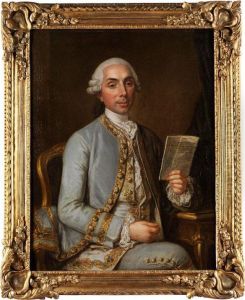Pierre Le Sueure Paintings
Pierre Le Sueur, or more commonly known by the anglicized version of his name, Pierre Le Sueur, was a French explorer and fur trader in the late 17th and early 18th centuries, whose activities significantly impacted the exploration and early European settlement of the North American continent. Born in 1657 in Artois, France, Le Sueur was part of the wave of adventurous Frenchmen who sought fortune and exploration in the New World. His contributions, however, are often overshadowed by more widely known explorers of his time, making his life and exploits a fascinating, albeit less familiar, story in the annals of North American exploration.
Le Sueur's notable contributions began after his arrival in New France, where he quickly became involved in the burgeoning fur trade, a key economic activity that drove French exploration and settlement in North America. His ventures led him deep into territories that are now part of the United States, including regions along the Mississippi River. Among his most significant expeditions was a journey up the Mississippi River in 1699-1700, during which he explored parts of what are now Minnesota and Wisconsin, areas rich in beaver pelts and other valuable fur-bearing animals. Le Sueur's expeditions were not merely commercial; they were also of scientific and exploratory significance. He was among the first Europeans to provide detailed descriptions of the geography, flora, fauna, and indigenous peoples of the upper Mississippi region.
Despite his contributions to the exploration and mapping of the North American interior, Le Sueur's endeavors were fraught with challenges, including conflicts with Native American tribes, rivalries with other European traders, and the logistical difficulties of navigating and surviving in largely unknown territories. His work laid the groundwork for future French exploration and trade in the region, contributing to the establishment of a French presence in the heart of North America that would persist until the mid-18th century.
Pierre Le Sueur died in 1716, leaving behind a legacy that, while not as celebrated as that of some of his contemporaries, was crucial in the expansion of European knowledge and influence in North America. His explorations contributed to the French understanding and claim of vast territories, paving the way for further exploration, trade, and eventual settlement. Today, Le Sueur is commemorated in various place names and historical markers, a testament to his role in the early history of French exploration in North America.
